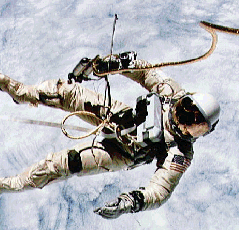Dutch research provides new insights into the human balance system as a result of exposure to the weightlessness in space by the astronauts

Astronauts who are in orbit around the Earth for extended periods allow researchers to better understand how "space sickness" develops. Researcher Suzanne Nooij, from TU Delft in the Netherlands, received her doctorate on May 20 after completing extensive research work on this topic.
The force of gravity is an important component in our spatial orientation, changes in the forces of gravity affect us since the body is required to adapt to the new situation and all the physiological systems affected by our equilibrium system adapt themselves to the new situation. During this time we can feel nausea, imbalance and visual illusions.
A change in the force of gravity in astronauts during their journey in space is more significant because it lasts for a long period of time so that their body is in a state of constant adaptation. About half of the astronauts suffer from "space sickness" (Space Adaptation Syndrome) during the first days of the journey.
Rotation in a centrifuge
It is interesting to note that the symptoms can also appear during prolonged exposure to strong gravitational forces in a centrifuge used to train pilots. To experience this, one must stay in the centrifuge for more than an hour and be exposed to gravitational forces 3 times greater than the gravity of the Earth. During the spin itself there is no effect but when leaving the centrifuge, about half of the people suffer from symptoms of space sickness. Astronauts who suffer from the symptoms in space, also suffer from the same symptoms when they return to Earth, hence this is not due to a lack of gravity but from adapting to different gravitational forces.
Suzanne Noji studied these effects with a centrifuge at the Center for Man and Aviation in the Netherlands. The results of her research lead to the conclusion that both forms of nausea (space sickness and after the centrifuge) are caused by the same mechanism. Comprehensive research provides new insights into the causes of the symptoms and their effect on the person under different conditions and analyzes in depth the mechanisms responsible for the balance.

6 תגובות
Both the plane and the spaceship are completely sealed and there is not enough oxygen in them and this causes some hallucinations in my opinion.
In my opinion, one of the problems is that the spaceship or the plane is moving at a high speed and causes a lack of blood and oxygen in the brain and the phenomenon of confusion.
A. Ben Ner:
All the professions you mentioned do experience different variations of the phenomenon as well as other people who fly, sail on ships and even travel in a car.
After all, it is known that seasickness, for example, is caused by a mismatch between the visual input and that sensed by the balance system (as a result of the change in the magnitude and direction of the equal force of gravity and persistence in view of the changing accelerations).
Zen is also the reason why people who suffer from motion sickness are suggested to sit in the front of the car and watch the road (this increases the match between the sensory inputs). In all these situations it is not about one long adaptation but a situation that is constantly changing and which does not allow adaptation at all.
In an airplane, the problem is less serious because the flight is usually quite smooth and adaptation is only required during the short periods of takeoff and landing.
"Since the body is required to adapt to the new situation and all the physiological systems affected by our equilibrium system adapt themselves to the new situation. During this time we can feel nausea, imbalance and visual illusions."
It's a shame that there isn't half a word in the article about what "space sickness" is.
I believe that pilots too, especially fighter and sport pilots. Both divers and sailors (!!!) are exposed to changing conditions of the influence of gravity. In my estimation, if the astronauts' disease does result, as explained in the article, from adapting to changing g conditions over time, then pilots, sailors and professional divers should also suffer from it.
As a former diver, I believe that I did notice then, among my fellow divers, certain characteristic, behavioral and physical symptoms, some of which are described in the article. Although it seems to me that at the time I attributed the above symptoms more to the physical and mental effort
of the activity and not precisely for the matter of adapting to a changing g.